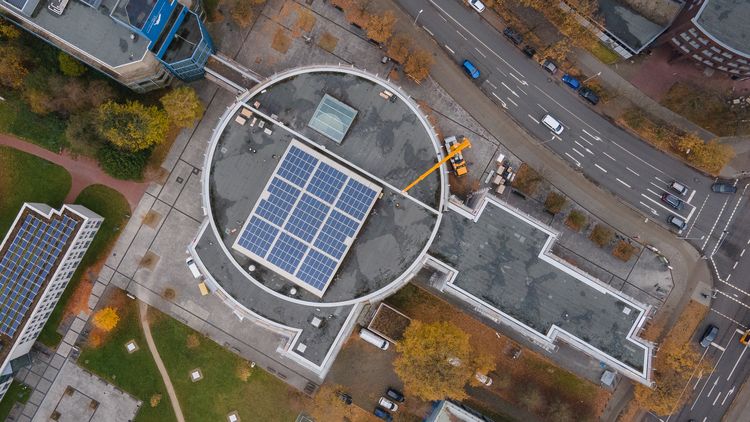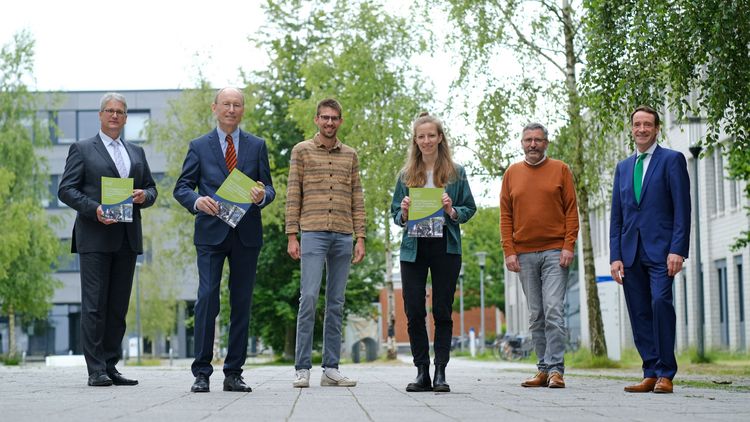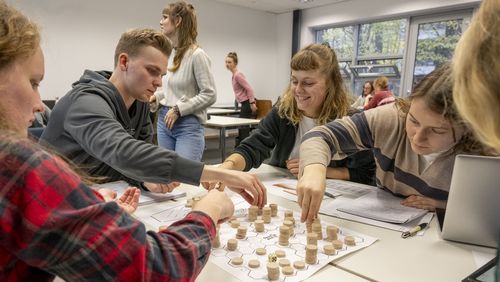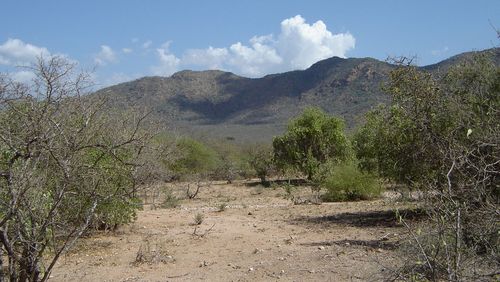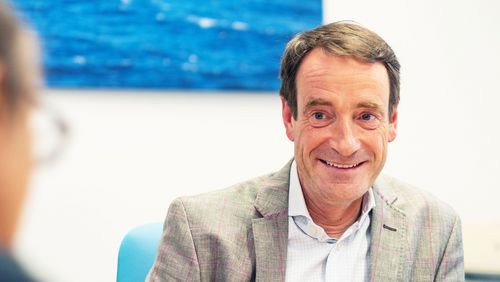Students have compiled the university's third sustainability report. It shows that considerable progress has been made: CO2 emissions, for example, have fallen by 70 percent since 2014.
Substantial cuts in greenhouse gas emissions and paper consumption: these are two examples for the sustainability efforts at the University of Oldenburg documented in its newly published third Sustainability Report. A group of students led by ecological economist Prof. Dr Bernd Siebenhüner and his colleague Lina-Luise Hölter compiled the data on the University's sustainability activities from 2017 to 2019. "Sustainability is firmly anchored at our University not only in research and teaching, but also in administrative and day-to-day operations," said Prof. Dr Hans Michael Piper, President of Oldenburg University, upon receiving the report. "Thanks to the dedicated work of the 20 Master's degree students and the support of many employees, the Sustainability Report documents how successfully the University is pursuing its goal of becoming climate neutral."
The report shows that the University's direct greenhouse gas emissions have decreased by almost 70 percent compared to the results of the previous report: its CO2 emissions dropped from more than 15,000 tonnes per year in 2014 to just under 5,000 tonnes by 2019. The main factor behind this reduction was the switch to green electricity in 2017. Another factor is the photovoltaic systems that were installed on the roof tops of various university buildings in 2017 and 2020. The report also points to a significant drop in paper and water consumption in recent years – despite rising student numbers.
Focus on sustainability in research and teaching
Sustainability has long been a focus of research and teaching activities at the University. The report, the organization of which was based at the University's transdisciplinary Centre for Environmental and Sustainability Research (COAST), shows that around seven percent of all students are enrolled in sustainability-related degree programmes, and several of its structured PhD programmes focus on the topic. The University's teacher training and medical studies programmes also address sustainability. The concept of "Education for Sustainable Development" is integrated into many of the University's education degree programmes, while in the medical degree programmes care services in rural areas, digitalization and healthy ageing are focus topics. "The University is making a contribution to implementing the United Nations' Sustainable Development Goals here," said Professor Siebenhüner, who heads the University's Ecological Economics research group.
In the chapter titled "Research", the report presents the projects and focus areas of the various institutes and faculties. It takes a closer look at two research projects, KLEVER-Risk and OptiMOOS, in which anti-flooding strategies and sustainable cultivation of peat moss are under investigation. In the chapter titled "Social Affairs and Employees", the report examines the ways in which the University is promoting diversity, inclusion and work-life-balance, which are also among the UN's Sustainable Development Goals. Here too, the University has made significant progress, for example by expanding childcare facilities and offering a wide range of advisory services and various contact points for students and staff. The General Students' Committee (AStA) also promotes diversity and combats discrimination through several services and bodies representing various interest groups. The report highlights the exemplary integration of people with impaired hearing through measures such as special events, the setting up of barrier-free group rooms, and the hearing research conducted in the "Hearing4all" Cluster of Excellence.
Many vegan and vegetarian dishes on offer
The Studentenwerk Oldenburg is an important partner of the University, and the report also encompasses this student services organization's efforts to promote sustainability in the areas of procurement, university catering and building management. The report emphasizes the fact that the University's catering facilities offer dairy products and meat from businesses that practice species-appropriate husbandry and local producers. Between 50 and 60 percent of the dishes on offer at the University's two canteens were either vegetarian or vegan.
The Sustainability Report is the result of the practical seminar project "Sustainability Reporting at the University of Oldenburg", which was held online due to coronavirus restrictions. The students also gathered data for the project in video and phone interviews. The report was compiled in accordance with the guidelines of the Global Reporting Initiative (GRI) and the university-specific sustainability code of the German government's Council for Sustainable Development (RNE).



